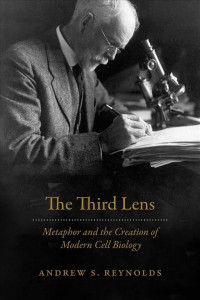CBU Professor Andrew Reynolds Releases The Third Lens
 Cape Breton University Professor of Philosophy, Andrew Reynolds, has just released his book The Third Lens, an examination of the role of metaphor in science. Published by the University of Chicago Press, the book asks the question, “Does science aim at providing an account of the world that is literally true or objectively true?”
Cape Breton University Professor of Philosophy, Andrew Reynolds, has just released his book The Third Lens, an examination of the role of metaphor in science. Published by the University of Chicago Press, the book asks the question, “Does science aim at providing an account of the world that is literally true or objectively true?”
What led Reynolds to the topic of his book was a combination of his background in cellular biology, and his interest in the way humans tend to turn to metaphor for clarification. “Humans of course always exist in a particular historical-social-cultural context, and metaphors help them to understand things that are unfamiliar in terms more familiar,” says Reynolds.
Reynolds began researching the history of cell theory biology 15 years ago and published a series of articles before starting to develop the book in 2013. The manuscript was written over the course of two years, followed by another year or two of submission, review and editing to complete the publishing process. Reynolds says it’s always nice to see your hard work materialize as a publication, whether it’s in the form of a journal article or a book.
Reynolds works in the School of Arts and Social Sciences here at CBU and as a philosopher his teaching and research bridge what novelist and chemist C.P. Snow called ‘the two cultures’ of science and the liberal arts. This relationship is highlighted in The Third Lens, in which Reynolds explains that metaphors are not just being used by scientists to simplify their theories and ideas for a mainstream audience. “Metaphors like signal transduction, genetic circuits and rewiring signalling pathways are integral to and constitutive of the way scientists think about and understand the world of cells and cellular biology,” says Reynolds.
One specific metaphor featured within the book is that of ‘editing the human genome’ or ‘genome tinkering’, which Reynolds says is currently one of the most significant. “It suggests a much greater ability to make precise and predictable changes in the outcomes for health than is currently possible,” says Reynolds.
If you’re interested in the nature of science, its history and how it makes sense of the world, The Third Lensoffers truly captivating perspectives, following in the wake of books such as Thomas Kuhn’s The Structure of Scientific Revolutionsand Evelyn Fox Keller’s The Century of the Gene.
What Reynolds hopes readers take away from his work, is that “science is both an exercise in creative thought and objective discovery, but is essentially an attempt by humans to make sense of the world.” He will be putting a chapter of his new book to work in a fourth-year interdisciplinary seminar on metaphor, being offered this winter at CBU.